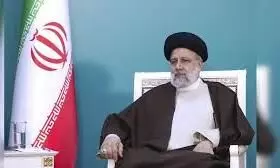
The tragic crash in Iran
text_fieldsThe world heard with shock the news that nine people, including Iranian President Ibrahim Raisi, Foreign Minister Hossein Amir-Abdollahian, and a provincial governor, were killed in a helicopter crash in Iran on Sunday afternoon, May 12. The accident took place in the border region of Iran's East Azerbaijan in conditions of bad weather. It was reported that none of the passengers in the helicopter were likely to survive, but the news of death was confirmed on Monday. Later, news agencies reported that the helicopter had been found, but other details about the condition of the burnt helicopter or dead bodies were not available at the time of writing this. Iran's Supreme Leader Ali Khamenei, who had called for prayers for the safety of Raisi and other senior officials from the start, reiterated after the news of his death that the tragedy would not change the way Iran would decide about its future. Vice President Mohammad Mokhber has taken over as interim president and as per the Iranian constitution a new president is to be elected in 50 days.
Also read: Iranian President Raisi and senior officials killed in helicopter crash
After the inauguration of Qiz Qalasi Dam, a joint venture between Iran and Azerbaijan, the helicopter, which was leaving for Tabriz with senior leaders, crashed in the thick forest area. The accident occurred on his way back from the inauguration of the dam across the Aras River jointly with Azerbaijan President Ilham Aliyev on Sunday morning. The combination of cloud, fog, and low temperature may have caused the pilot to lose control, so it can be assumed that the loss of communication with the control centre is not unusual. All the leaders of the countries of West Asia have expressed deep sorrow at this tragedy. As a country with multi-layered relations with India, any disaster that Iran may face will impact India as well. This was reflected in the condolence message of Prime Minister Narendra Modi as well. The relations have been amply borne out in the case of the recently signed agreement on Chabahar project itself.
Also read: UAE leaders express condolences over death of Iran's President Raisi
Ibrahim Raisi was considered to be a close follower and successor of the country's Supreme Leader, Ali Khamenei. When he was elected president in 2021, media and observers, given to clasifying Iranian politicians into conservative and liberal camps, placed Raisi as an arch-hardliner. And Raisi's actions during his previous roles including as Chief Justice had also come in for much criticism. In the Palestine-Israeli issue, Israel has frequently accused Iran of arming Hamas, Lebanon's Hezbollah, Yemen's Houthis, and Shiite groups in Syria and Iraq during the ongoing conflict. This was mainly due to Iran's uncompromising stance towards Israel's genocide and its anti-Palestinian stance. A bete noir always for America, Iran has become a target of attention among other Western powers too for its policies. Raisi was targeted by opponents in the name of these viewpoints. Hence, there are speculations about the sinister possibilities behind the helicopter crash. It is also natural to look for any involvement of Iran's adversaries in the accident.
Also read: No decision to build a nuclear bomb but..: Iran hints at nuclear ambitions
The US and Israel have recently launched attacks against Iran's military leadership. In retaliation, d Iran launched a missile attack on Israel after several warnings. While Tel Aviv claimed to have warded off most of the drones by its aerial defensive shield, Iran rejected Tel Aviv's version. All the same, Iran said it was calling off the attack because it intended no military purpose beyond sending a message. In this background, some suspect Israel's secret involvement in Raisi's assassination because Israel is determined to settle its grudge against Iran and carry out secret military operations in this war environment, but some think that since Raisi is not the only force dictating Iran's anti-Israel policies, they will not go as far as to kill a head of state. Although the West observes that Raisi has rivals domestically as well, such possibilities have generally ended through Iran's internal democracy. However, Raisi departs leaving many questions unanswered. The world is left to watch out for Supreme Leader Ali Khamenei's position and election of new leadership, especially at a time where Iran's policy positions on the Palestinian issue, which remains intractable, are considered more critical.
Also read: Iran urges Kuwait to return to negotiations over disputed gas field























